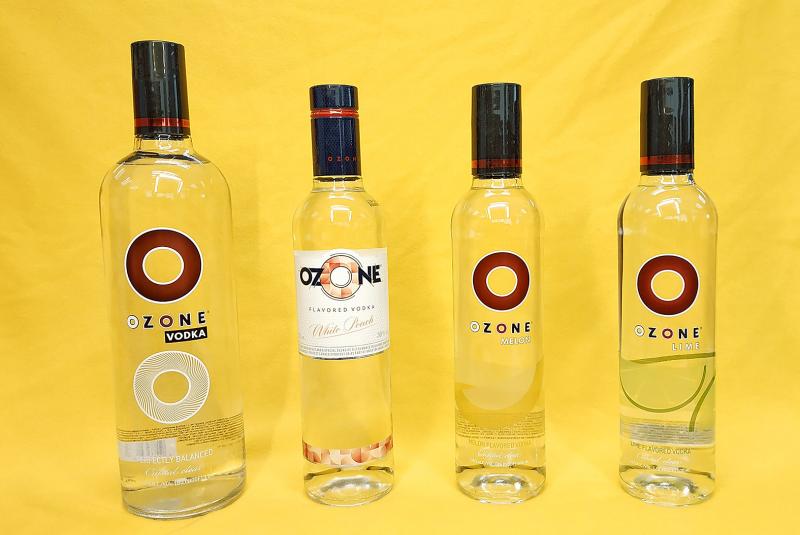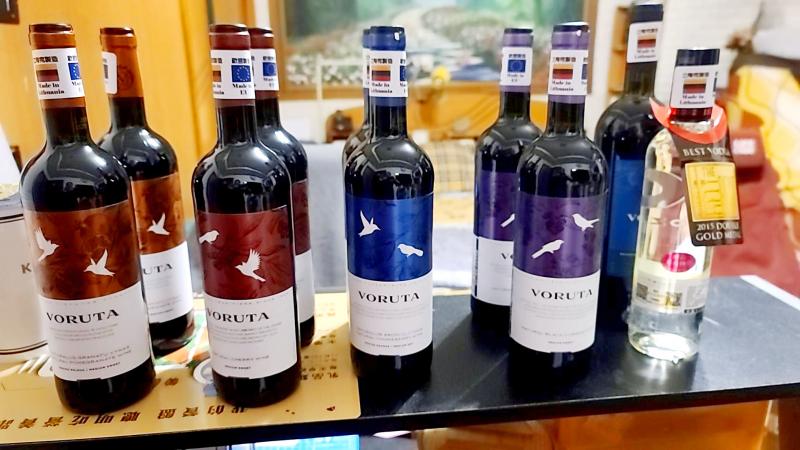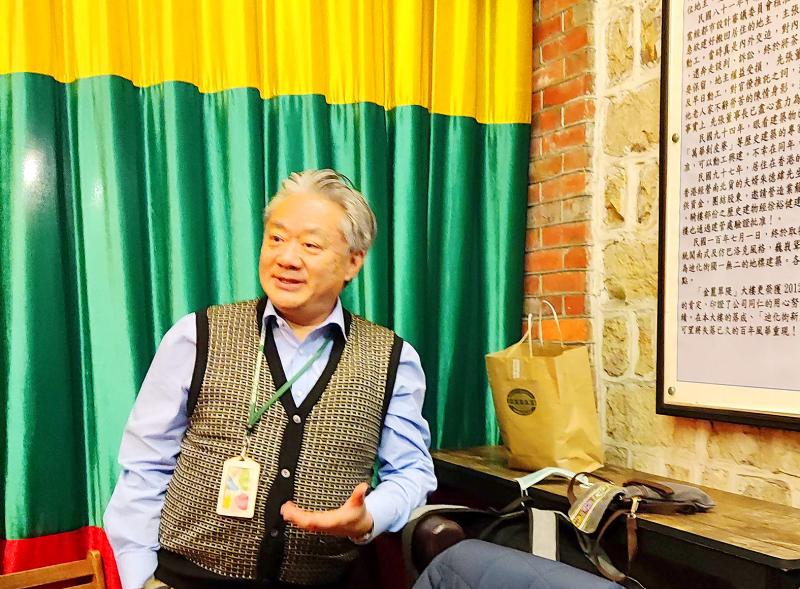Once Peter Young (楊良棟) gets going, you can’t be sure where he’ll end up. One minute, it’s eighteenth-century Baltic history, the next, the health benefits of chokeberry wine.
A discussion of the current situation in his native Hong Kong kicks off a sweeping tour of Chinese history that begins with the 1966 riots in the city state, then jumps back seven centuries to Mongol rule, before rejoining the twentieth century with the massacre of the Manchus in the wake of the 1911 Revolution. Along the way, there are detours to Vichy France, 1960s Taiwan and Young’s school days in Geneva for good measure.
It’s hard not to warm to Young as he holds forth at Little One Bar (立陶宛) just off Dihua Street (迪化街) in Taipei’s Datong District (大同區). Admittedly, it’s difficult pinning him down at times, as he seems compelled to offer meandering perspective and background on any given topic. On some subjects, though, Young is unambivalent: the recent popularity of Lithuania’s Volfas Englemann beer, for example.

Photo courtesy of Peter Young
“It’s a fad,” says Young, CEO of Scapa Scandia Taiwan Ltd (新歐發展有限公司, an importer of Lithuanian alcoholic products to Taiwan. “It’s a pretty good beer, but Taiwan has a lot of beers already, so there’s not a lot of uniqueness unless you’re a really avid beer drinker.”
There are also logistical problems: A short shelf-life coupled with long delivery times mean the window for selling the product is limited, says Young, who also imports from other Baltic nations, Poland, Moldova and Italy. “Shipments are very expensive, and locally produced beer or even Japanese beer can get on the market much quicker,” Young says. “Then you’ve got the freezing weather in Lithuania, which means it can’t be delivered in winter.”
FLAVOR OF THE MONTH

Photo courtesy of Peter Young
Having done business in the Baltics for over a decade, Young is similarly skeptical about the long-term potential for other consumer products, such as the chocolate brand Ruta, which saw a spike in sales thanks to goodwill from Lithuania’s warming relations with Taiwan.
“I can show you many kinds of chocolate from Latvia, Ukraine and Belarus that are just as good and cheaper,” he says.
Instead, Young is focused on the Voruta brand of berry wines.

Photo: James Baron
“Wine keeps for a long time,” he says. “Number two, berries are abundant in the Baltics: blackcurrant, blackberry and chokeberry. Also, they’re sweet — but not too sweet — and have a lower alcohol content.”
These qualities, Young believes, make the wine suited to the Taiwanese palate, while the purported health benefits — “antioxidants and natural ingredients” — are another plus.
“Health is big selling point here,” says Young.
Elsewhere, Young sees possibilities for the Stumbras range of vodkas, which he touts as “good or better than the best Russian vodkas” and far superior to the “run of the mill brands” available in Taiwan. However, this currently remains a niche product, supplied to high-end cocktail bars, and pitching it to bar owners can be problematic.
“If you go in point blank and say, ‘This is a great vodka,’ in a way, you’re almost insulting them by saying the one they have is no good. So, you have to be careful and build a relationship.”
Young also believes Lithuania’s dairy products may have some staying power, though many of these are currently awaiting import authorization.
FOND MEMORIES
Although he didn’t establish himself in Taiwan until 2018, when he acquired residency under an immigration scheme for Hong Kong and Macau entrepreneurs, Young has a long association with Taiwan. He first visited with his mother and aunt, as an eight-year-old in 1966, after his grandparents had relocated there to avoid the upheaval of the riots in Hong Kong that same year.
“They had already fled Shanghai and had all their assets confiscated, so they were already shaken and frail from the experience” Young says. “My father was very concerned that the Chinese military would use the riots as an excuse to invade. So, he decided to move them to Taiwan.”
Although he cannot recall exactly where his grandparents lived for the two years they were in Taipei, he retains fond memories of trips to Yangmingshan and the smalltown feel the city had back then. “Taipei was very rustic … dust all over the place,” he says. He continued to visit “sporadically” over the years.
A 2010 return to Taiwan, after several years without visiting the country, cemented his decision to settle here. Since then, he has been cooperating with his friend David Yeh (葉國憲), who runs the Little-one Bar, which showcases Lithuanian booze. (“Little-one” sounds like the Mandarin for “Lithuania.”)
He is pragmatic about the future for Lithuanian imports, which he says have been overhyped due to the buzz over closer ties. “These products have gripped headlines, but in a free market, they will eventually trend to equilibrium after media attention dies down,” he says. “Lithuanian products, such as berry wines and maybe dairy, which are competitive and well-positioned will sell — other stuff, not so much.”

When nature calls, Masana Izawa has followed the same routine for more than 50 years: heading out to the woods in Japan, dropping his pants and doing as bears do. “We survive by eating other living things. But you can give faeces back to nature so that organisms in the soil can decompose them,” the 74-year-old said. “This means you are giving life back. What could be a more sublime act?” “Fundo-shi” (“poop-soil master”) Izawa is something of a celebrity in Japan, publishing books, delivering lectures and appearing in a documentary. People flock to his “Poopland” and centuries-old wooden “Fundo-an” (“poop-soil house”) in

Jan 13 to Jan 19 Yang Jen-huang (楊仁煌) recalls being slapped by his father when he asked about their Sakizaya heritage, telling him to never mention it otherwise they’ll be killed. “Only then did I start learning about the Karewan Incident,” he tells Mayaw Kilang in “The social culture and ethnic identification of the Sakizaya” (撒奇萊雅族的社會文化與民族認定). “Many of our elders are reluctant to call themselves Sakizaya, and are accustomed to living in Amis (Pangcah) society. Therefore, it’s up to the younger generation to push for official recognition, because there’s still a taboo with the older people.” Although the Sakizaya became Taiwan’s 13th

For anyone on board the train looking out the window, it must have been a strange sight. The same foreigner stood outside waving at them four different times within ten minutes, three times on the left and once on the right, his face getting redder and sweatier each time. At this unique location, it’s actually possible to beat the train up the mountain on foot, though only with extreme effort. For the average hiker, the Dulishan Trail is still a great place to get some exercise and see the train — at least once — as it makes its way

Earlier this month, a Hong Kong ship, Shunxin-39, was identified as the ship that had cut telecom cables on the seabed north of Keelung. The ship, owned out of Hong Kong and variously described as registered in Cameroon (as Shunxin-39) and Tanzania (as Xinshun-39), was originally People’s Republic of China (PRC)-flagged, but changed registries in 2024, according to Maritime Executive magazine. The Financial Times published tracking data for the ship showing it crossing a number of undersea cables off northern Taiwan over the course of several days. The intent was clear. Shunxin-39, which according to the Taiwan Coast Guard was crewed